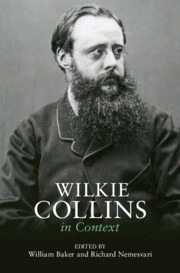64 results
Wessex Tales
- Coming soon
-
- Expected online publication date:
- November 2024
- Print publication:
- 30 November 2024
-
- Book
- Export citation
Abbreviations
-
- Book:
- Wilkie Collins in Context
- Published online:
- 27 July 2023
- Print publication:
- 10 August 2023, pp xxxiv-xxxv
-
- Chapter
- Export citation
Illustrations
-
- Book:
- Wilkie Collins in Context
- Published online:
- 27 July 2023
- Print publication:
- 10 August 2023, pp viii-viii
-
- Chapter
- Export citation
Chapter 18 - Wilkie Collins and Sensation Fiction
- from Part III - Contexts: Literary
-
-
- Book:
- Wilkie Collins in Context
- Published online:
- 27 July 2023
- Print publication:
- 10 August 2023, pp 168-176
-
- Chapter
- Export citation
Part I - Life and Works
-
- Book:
- Wilkie Collins in Context
- Published online:
- 27 July 2023
- Print publication:
- 10 August 2023, pp 1-86
-
- Chapter
- Export citation
Chapter 12 - T. S. Eliot to 1990
- from Part II - Critical Response and Afterlife
-
-
- Book:
- Wilkie Collins in Context
- Published online:
- 27 July 2023
- Print publication:
- 10 August 2023, pp 105-114
-
- Chapter
- Export citation
Part III - Contexts: Literary
-
- Book:
- Wilkie Collins in Context
- Published online:
- 27 July 2023
- Print publication:
- 10 August 2023, pp 145-198
-
- Chapter
- Export citation
Further Reading
-
- Book:
- Wilkie Collins in Context
- Published online:
- 27 July 2023
- Print publication:
- 10 August 2023, pp 324-331
-
- Chapter
- Export citation
Part IV - Contexts: Cultural and Social
-
- Book:
- Wilkie Collins in Context
- Published online:
- 27 July 2023
- Print publication:
- 10 August 2023, pp 199-323
-
- Chapter
- Export citation
Notes on Contributors
-
- Book:
- Wilkie Collins in Context
- Published online:
- 27 July 2023
- Print publication:
- 10 August 2023, pp ix-xvi
-
- Chapter
- Export citation
Copyright page
-
- Book:
- Wilkie Collins in Context
- Published online:
- 27 July 2023
- Print publication:
- 10 August 2023, pp iv-iv
-
- Chapter
- Export citation
Frontispiece
-
- Book:
- Wilkie Collins in Context
- Published online:
- 27 July 2023
- Print publication:
- 10 August 2023, pp xxxvi-xxxvi
-
- Chapter
- Export citation
Index
-
- Book:
- Wilkie Collins in Context
- Published online:
- 27 July 2023
- Print publication:
- 10 August 2023, pp 332-348
-
- Chapter
- Export citation
Part II - Critical Response and Afterlife
-
- Book:
- Wilkie Collins in Context
- Published online:
- 27 July 2023
- Print publication:
- 10 August 2023, pp 87-144
-
- Chapter
- Export citation
Contents
-
- Book:
- Wilkie Collins in Context
- Published online:
- 27 July 2023
- Print publication:
- 10 August 2023, pp v-vii
-
- Chapter
- Export citation
Preface
-
- Book:
- Wilkie Collins in Context
- Published online:
- 27 July 2023
- Print publication:
- 10 August 2023, pp xvii-xxi
-
- Chapter
- Export citation
Chronology
-
- Book:
- Wilkie Collins in Context
- Published online:
- 27 July 2023
- Print publication:
- 10 August 2023, pp xxii-xxxiii
-
- Chapter
- Export citation

Wilkie Collins in Context
-
- Published online:
- 27 July 2023
- Print publication:
- 10 August 2023
Chapter IV - The Events Of One Day
- from Volume 3
-
- Book:
- Desperate Remedies
- Published online:
- 05 March 2021
- Print publication:
- 15 August 2019, pp 323-334
-
- Chapter
- Export citation
Apparatus
-
- Book:
- Desperate Remedies
- Published online:
- 05 March 2021
- Print publication:
- 15 August 2019, pp 415-416
-
- Chapter
- Export citation



